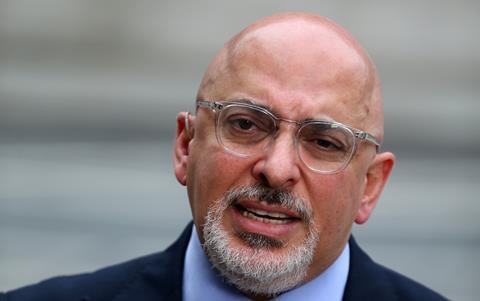Rumours rail project could be victim of expected spending cuts after disastrous mini-budget
Nadhim Zahawi has rubbished rumours that HS2 could be sacrificed to demonstrate the sustainability of UK finances.
Chancellor Kwasi Kwarteng is expected to make spending cuts after a disastrous response to his mini-budget last month and there has been speculation that the rail megaproject could face the axe with calls from some Conservatives to ditch it.

However, speaking at a fringe meeting at the Conservative Party conference in Birmingham yesterday, the chancellor of the Duchy of Lancaster insisted that the rail megaproject was going ahead.
“There is no way HS2 is going to be scrapped. HS2 is going ahead,” said Zahawi.
Given that, as of March, £14.3bn has already spent – and another £12.7bn under contract – on the first phase of the scheme, it is unlikely that the government would cancel it wholesale.
While it could scrap the next section, which runs from the Midlands to Crewe and onto Manchester, such a move could be deeply unpopular with northern Tories and their constituents, who have already seen the government row back on promised investments in Northern Powerhouse Rail.
Conservative MP and HS2 opponent Andrew Bridgen told the Today programme last week that the government should “get on an announce” that the project would be ditched, while influential Conservative donor Lord Wolfson of Aspley Guise has said it would be “top of our list” if spending cuts were necessary.
Zahawi, who was speaking at an event in support of West Midlands Mayor Andy Street, also emphasised the importance of the government’s new investment zone agenda and told the local audience: “I want the first investment zone to be here in Birmingham.”
On Sunday, the government announced it was encouraging formal applications from local authorities to set up investment zones and Street said at Monday’s event he had already agreed with Coventry City Council and Warwick District Council that an application would be put forward for an investment zone in the Midlands to facilitate the development of a new gigafactory.
The government hopes the investment zones will stimulate investment through tax and regulatory incentives. On the first day of conference, Wales secretary Robert Buckland compared the zones to the free enterprise zones established by Lord Heseltine during Margaret Thatcher’s first government and said he saw them as “part of the levelling up agenda” and a continuation of Johnson’s interventionist approach to government.
“We make interventions where appropriate,” he said. “The idea that the government has come to preach trickle-down economics is for the birds.”
Heseltine himself is in Birmingham this week and told an event hosted by the European Movement that to be successful his free enterprise zones had “had to have planning powers, land acquisition powers, leadership and certainty they would still be there in four to five years”.
>> Day two at the Tory conference: U-turns and Brexit cast shadow over growth agenda
Heseltine bemoaned the lack of a single point of contact for local authorities seeking to speak to government about leveraging public investment opportunities, asking: “How many phone calls do you have to make to Whitehall now?”
“You can’t run a successful economy like that. And no other capitalist country tries to do it – they have strong devolved governments.”
He also emphasised the need for government ministers to get on the ground and understand the local context. “My whole experience of urban regeneration is that you have to go there and listen. The weakness of the current system is that they think Whitehall knows best,” he said.
Elsewhere at conference, ex-cabinet minister Theresa Villiers also expressed skepticism about the investment zones, raising concerns about the “erosion of local decision-making in planning”.
David Thomas, chief executive of Barratt Homes, said he did not want to see “investment zones being used to short-circuit environmental regulation”, while Paul Brocklehurst, chair of the Land Promoters and Developers Federation, told Building that he suspected the zones would see commitments to good design in the Levelling-up and Regeneration Bill cast aside in order to fast track development.
“I expect design codes are going to go in investment zones,” he said.



























No comments yet